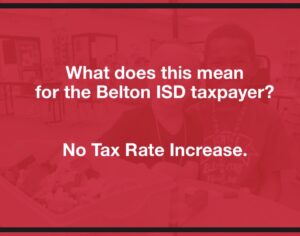Belton ISD Responds to Bell County GOP Bond Opposition
NOTE: This article specifically addresses the Belton ISD bond election, but most of the points are also applicable to the Temple ISD election.

Graphic by Alex Anderson for WBDaily.
The days in which voters indiscriminately “rubber stamped” bond elections are over and school district administrators seem to be struggling with this new reality.
Belton ISD Superintendent Matt Smith is a local example with his response to the Bell County Republican Party Executive Committee’s recent (and unanimously) approved resolution opposing two school bond propositions seeking $173.8 million in new school district debt (closer to $243 million when interest is added).
The BISD perspective
“We respect that in a democracy everyone is entitled to their own opinion regarding any item up for election,” Smith told the Temple Daily Telegram. “However, we would expect a group to reach out to Belton ISD, request a meeting with BISD leaders to discuss the issues, get the facts right and have accurate information before they formalized an opinion on behalf of a county-wide organization.”
The article also states:
The Belton ISD superintendent — who noted how the absence of this financing could result in implementing fewer staff raises, adding fewer positions and installing more portable buildings — stressed how the Bell County Republican Party did “none of those things.”
While scolding what he perceives as the GOP’s failure to “seek to understand the basics of school finance, legislative mandates surrounding bond elections or the proposed projects within the propositions,” the Telegram article includes no refutation by Smith of 16 specific points within the resolution that address a variety of bond-related issues.
Contrary to Smith’s admonition, these points suggest that due diligence was in fact performed, just not due diligence under the tutelage of BISD as evidently Smith would have preferred. Good thing this is a democracy and everyone is entitled to their own opinion.
And as bonds are issued to fund capital improvements, Smith’s equating “fewer staff raises” due to the “absence of this financing” seems questionable under state law. Even direction from the Texas Association of School Boards (TASB), the guiding light of school district thought and action, clearly separates salary administration from bond revenue as required by law. TASB instructs member districts on the two parts comprising a school district’s tax rate: Maintenance and Operations (M&O) and Debt Service (I&S).
Per TASB, “Maintenance and operations taxes fund the General Operating Fund, which pays for salaries, supplies, utilities, insurance, equipment, and the other costs of day-to-day operations.” It describes revenue from the Debt Service tax rate as “can be used only to retire bonds sold for specific purposes: construction, renovations, buses, portable buildings, land, technology, and the cost of issuing bonds.”
BISD employees and other bond supporters hopefully recognize that passage of this new tax liability is not a legal source for funding staff raises
Smith cites a “months-long process” in BISD’s bond proposition development. “After touring campuses and reviewing data from 11 different sources, a community group of 70 citizens said, yes, we need to hold a bond election this May, and then prioritized the list of project needs,” he said.
Indeed this seems a thorough process, but shouldn’t that be a minimal expectation when asking taxpayers to assume new debt in financing a school district’s proposed vision for the future?
No doubt that it’s good to understand a government school district’s perspective when asking taxpayers to approve an estimated $243 million of new debt. Let’s not ignore, however, taxpayers rightfully having their own considerations in assuming new financial liability.
Taxpayer considerations
Belton resident Phil Krawczynski shared his views with the Telegram.
“We’re now facing increasing prices for everything from food to gas — coupled with an increase in property taxes that the Bell County Appraisal District has burdened taxpayers with the last three years,” he said during a February meeting.
“Please remember your loans are the taxpayers’ burden,” he said. “Your service is not only to educate but to be responsible stewards of our money.”
Fiscal responsibility
Responsible stewards indeed. And the fiscal impact of this or any other bond proposal is an important consideration. Government bond election advertising generally includes a principal only amount. With penalty and interest, bond packages generally cost an additional 40 to 50%. With BISD’s propositions, the final amount will add more like $243 million to the district’s $360.1 million existing debt. That’s a consideration.
Growing government
The GOP’s 16-point resolution addresses the need to “reverse the current trend of expanding government and the growing tax and debt burdens.” Public support for this trend reversal is evidenced with a growing number of recent bond campaigns (particularly school) failing to garner voter support.
Following the November 2021 election, James Quintero of the Texas Public Policy wrote:
Something happened last week that hasn’t happened in a long time—for the first time in a decade, Texas voters said “NO” to most school district bonds.
Here’s more from The Texan:
“Last week, a majority of proposed bonds on the November ballot failed for the first time since 2011, when only 17 of the 37 proposed bonds passed.
…..
“…the results show a clear shift from both previous years and even May of this year, when voters approved a whopping 93 of the 113 school bonds on the ballot.”
Over the last two decades, local governments (cities, counties, school districts, community college districts, etc.) have enjoyed near guaranteed voter approval of bond propositions with school districts representing the majority of this new debt.
The evidence is easy to see as our streets are lined with striking government facilities (even complexes) – either new or radically remodeled – and equipped with state-of-the-art equipment and furnishings.
These facilities serve as operational centers for the most basic of services upon which most taxpayers agree with and depend upon. These facilities, however, also house what many now see as ever-growing and intrusive government.
Growing government is losing its allure. Bad policies and eroding economic conditions are exacerbating this sentiment. It should surprise no one that this has become an issue in today’s bond election scenario.
Soaring inflation and its consequences
Inflation is at record high levels. Per The New York Post,
Costly inflation climbed even higher to a new four-decade high of 8.5% in March as the Russia-Ukraine war contributed to a record surge in gas prices and exacerbated existing supply chain disruptions — forcing Americans to pay even more for basic goods.
The latest uptick in March marked the highest annual rate of increase of inflation since December 1981, according to data from the Bureau of Labor Statistics released Tuesday.
On a monthly basis, the Consumer Price Index — a closely tracked inflation gauge that details the costs of goods and services — rose 1.2% from February to March.
Labor Department officials said price increases for gasoline, shelter and food were the largest contributors to inflation. The gasoline price index rose 18.3% in March.
With gasoline (and other energy), shelter and food costs rising, many Americans are financing portions of these increases via credit cards. As interest rates climb, this short-term credit management vehicle will also become more costly along with home mortgages, car loans, etc.
The Post further reported:
The average US household spent an extra $327 in March due to inflation, according to calculations by Ryan Sweet, a senior economist at Moody’s Analytics. That’s up from roughly $297 per household in February, when the Consumer Price Index jumped 7.9%.
The 2019 U.S. Census Bureau lists Belton as having individual median annual income of $25,439 and household median annual income at $55,539. These aren’t the kind of numbers that can easily absorb today’s inflationary rates.
With a recession likely in 2023, think a disastrous economy won’t be a factor in voting to assume or reject new local government debt?
“Lucrative” taxpayer-funded salaries
And here’s another point on income which voters may want to consider. Erin Anderson at Texas Scorecard reports how “dozens of Texas public school superintendents are taking home super-size salaries, according to newly released data from the Texas Education Agency.”
The article further notes how the “lucrative” taxpayer-funded salaries often include hefty retention bonuses and are “supplemented by benefits like insurance; pension contributions; and allowances for cars, phones, and housing.”
From the article:
“What is there to justify these exorbitant salaries?” asked James Quintero, a policy director for free-market think tank Texas Public Policy Foundation. “Public school enrollment is on the decline statewide, student outcomes are abysmal, and taxpayers are struggling to get by. If anything, superintendent pay should be trending down to better match realities on the ground.”
In the case of BISD, TEA lists Smith’s annual base salary as $234,600. The 2020 TEA Snapshot lists BISD’s average central administrative salary as $105,149 (an average teacher salary is $54,733).
A TASB news release from November, 2021, lists the median 2021-22 Texas school superintendent salary as “$143,969, up 4.8 percent from prior year as school districts seek to recruit and retain talent, according to the annual Texas Association of School Boards (TASB) and the Texas Association of School Administrators (TASA) Superintendent Salary Survey.”
With these numbers, it’s no wonder that school superintendents and other administration officials might have conflicting points of view with district residents on the affordability of new bond debt.
Meanwhile, taxpayers are seeing their costs to “recruit and retain talent” grow. Can they afford new bond debt as well?
Trust in government?
Things became contentious as 2021 brought parents to their school boards and administrators with “return to normalcy” concerns centered around government overreach and specifically in-class teaching options, social distancing, mask and vaccine mandates as well as the use of Critical Race Theory concepts in classroom curriculum.
Concerns heightened upon the public learning how the National School Boards Association (NSBA) requested the following of the Biden administration regarding outspoken parents and other interested parties.
As these acts of malice, violence, and threats against public school officials have increased, the classification of these heinous actions could be the equivalent to a form of domestic terrorism and hate crimes.
Texas ISDs Look To “Domestic Terrorist” Parents in Upcoming School Bond Elections explains the NSBA issue, school districts’ loyalty to organizations like TASB and NSBA and why district residents should pay attention.
As the article notes, TASB isn’t the only organization that is associated with local governments and that uses taxpayer funds to lobby against the taxpayer interests. The education industry additionally has the Texas Association of School Administrators (TASA) while local counties support the Texas Association of Counties (TAC) and cities support the Texas Municipal League (TML). These organizations share a common bond via their dependence on taxpayer funds (i.e., local government dues) that are then used to pursue actions on behalf of member governments – actions which often directly conflict with taxpayer interests.
Government in action

Slide by BISD
A TASB-sponsored coaching session to optimize bond election outcomes was recently featured at an education component of Austin’s SXSW festival. It centered on a 2019 law that requires school bond propositions to include “This is a property tax increase.” on the ballot.
One session presenter blamed “angry parents and uneducated voters” for recent school bond election defeats and called the new ballot language “bad for business.” Other presenters offered guidance on messaging and strategies school districts can use to sidestep the issue.
In Targeting Voters in a School Bond Election, the School Superintendents Association offers members guidance on how the “advent of social media technologies and sophisticated voter targeting software has transformed public voting on school finance issues from a guessing game to a science.”
As local government bond elections are sophisticated undertakings, the undated article identifies voter targeting as the principal element in election science and revealed BISD’s participation in an election experiment. For time context, the article references Vivian Baker who served as BISD superintendent from 2001 to 2010.
The Belton, Texas, Independent School District, located 40 miles north of Austin, experienced a major victory recently due, in large part, to the district’s willingness to conduct an experiment in the science of modern election planning.
Belton identified all registered-voter households with at least one voter who voted in 50 percent or more of all elections held over the previous five years. Why? Many registered voters never or rarely vote. Identifying those most likely to vote allows a targeted, one-to-one approach with those voters most likely to directly impact the outcome of your election.
Let’s take that concept a step further. If you merge that voter data with student directory information, you have a list of likely registered voter parents by campus. We merge the data with various local lists, including civic club memberships, booster clubs and an employee directory.
This was an incredibly successful strategy for the 8,800-student Belton district. With lists of likely voters by campus, then-superintendent Vivian Baker, a few members of her staff and a couple of school board members began making phone calls.
“When you first suggested we call the registered voters with children in our schools, I thought, ‘Oh, no! I can’t do one more thing.’” Baker said. “But I took a deep breath and started my calling the very next day, and I finished them in a few days — almost 100 calls! The experience was so worthwhile for me. The majority of the people were friendly and seemed appreciative. Not one call was outwardly negative.”
A voter who receives a call directly from the superintendent reminding them to vote and asking whether they have any questions is inspired to vote … and vote yes.
Again, the time frame of this article is indeterminable, but several interesting points emerge. First, voters should understand that school districts view bond elections as high stakes endeavors and are sharply calculating in the execution of their ensuing campaigns. Second, peer pressure is an always important and ever-present component of bond campaigns. This article’s acknowledgement of its blatant use is refreshing not from an ethical standpoint, but at least from its honesty. And third, perhaps election laws were more relaxed during BISD’s “experimental” election time frame, but even TASB cautions members regarding campaign behavior and use of school resources for advocacy (Step 2: Order the Election).
Cue the pompoms
As the final election stretch approaches, BISD along with its Chamber of Commerce and other establishment buddies are waving the pompoms, working the talking points and ramping up the peer pressure. With that, voters should avoid being influenced by how they are being worked and instead focus on what works best for them – both now and in the future.
Lou Ann Anderson worked in central Texas talk radio as both a host and producer and currently hosts Political Pursuits: The Podcast. Her tenure as Watchdog Wire–Texas editor involved covering state news and coordinating the site’s citizen journalist network. As a past Policy Analyst with Americans for Prosperity–Texas, Lou Ann wrote and spoke on a variety of issues including the growing issue of probate abuse in which wills, trusts, guardianships and powers of attorney are used to loot assets from intended heirs or beneficiaries.

